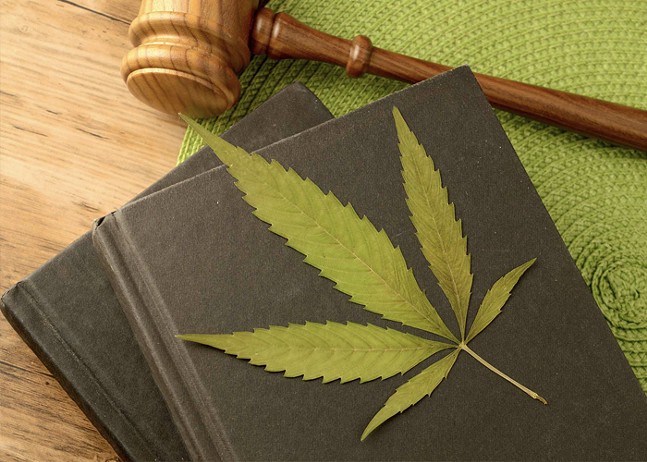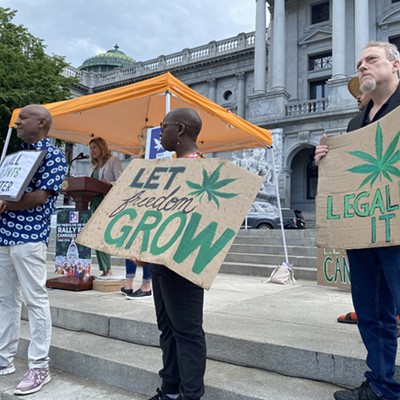Pennsylvania Gov. Tom Wolf and Lt. Gov. John Fetterman have unveiled a new statewide effort to pardon some Pennsylvanians with marijuana-related criminal convictions. The announcement comes as Fetterman, also a candidate for U.S. Senate, called on President Joe Biden to decriminalize marijuana ahead of a scheduled White House stop in Pittsburgh for Labor Day.
“It’s long past time that we finally decriminalize marijuana,” Fetterman said in a statement. “The president needs to use his executive authority to begin descheduling marijuana, I would love to see him do this prior to his visit to Pittsburgh. This is just common sense and Pennsylvanians overwhelmingly support decriminalizing marijuana.”
Thousands of Pennsylvanians would be potentially eligible for the pardon project, according to a statement from Wolf’s office. Those convicted of either (or both) of two specific marijuana charges would be eligible: “possession of marijuana”, or “marijuana, small amount personal use.”
“This pardon project has the potential to open the door for thousands of Pennsylvanians — the college grad looking to start their career, the grandparent who’s been wanting to chaperone a field trip, or any Pennsylvanian who’s been told 'no’ for much needed assistance,” Wolf said. “Now’s your chance.”
There is no time limit for the age of the conviction under the pardon project, which runs through Sept. 30, but the conviction had to take place in Pennsylvania.
Those who qualify can apply at the project website without paying a fee. After the application period closes Sept. 30, the state pardons board will conduct merit review sessions beginning Oct. 13 to decide if petitioners will get a public hearing. Between Dec. 13-16, the board will vote on individual cases in public hearings, which applicants aren’t required to attend..
The board then sends its recommendations to the governor for review. There’s no specific date by which the governor has to act on the pardons, but Wolf’s term ends in January, and a future administration may not continue to program. Sometime after Dec. 16, petitioners will be notified, and those who receive pardons will receive official documentation in the mail.
People with additional convictions aren’t eligible for the program, but can apply for clemency using the state’s standard application.
Patrick Nightingale, an attorney and executive director of marijuana reform group Pittsburgh NORML, said in an email to City Paper he was “very grateful” that Pennsylvanians with minor cannabis offenses would be able to quickly clear their records under the pardon project. But he questioned the limitations of the program.
“It has been my experience in surrounding counties that paraphernalia is routinely charged when one is charged with a small amount—smoking devices, grinders, rolling papers, blunt wrappers,” Nightingale writes. “Even the baggie containing the small amount are all considered paraphernalia under Pennsylvania law.”.
Nightingale also says he doesn’t think the pardon program would benefit large numbers of people in Allegheny County, “as we never prosecute a ‘small amount’ charge standing alone to conviction.” Such cases, he says, are routinely reduced to a non-traffic summary citation, like disorderly conduct, where offenders pay fines of up to $300.
According to an article published by NORML, state and local police in Pennsylvania arrested more than 20,000 people for cannabis offenses in 2020. Black residents are more than three times as likely to be arrested for marijuana in the state than white residents, the story argues.
Meredith Buettner, executive director of the Pennsylvania Cannabis Coalition (PCC) expressed support for the pardon project. The PCC is a nonprofit advocacy organization that works with medical marijuana operators and industry professionals.
“As the state’s medical marijuana program surpasses its six year mark, legislators on both sides of the aisle have changed their minds on cannabis. They’ve witnessed a once illicit market help thousands of Pennsylvanians,” Buettner said. “This effort by state leaders is common sense governing and we believe that legislators will do the right thing — give thousands of underprivileged Pennsylvanians a chance to get on the same playing field.”
This week, during an interview with the Philadelphia Inquirer, Fetterman said he plans to push Biden to decriminalize marijuana during the Labor Day visit. The lieutenant governor has been a longtime proponent of legalizing marijuana, and, shortly after taking office in 2019, embarked on a 67-county “listening tour” of Pennsylvania. According to the report on his tour, between 65 and 70 percent of Pennsylvanians supported adult-use cannabis legislation, and support for mass expungement of non-violent and small cannabis-related offenses was nearly unanimous.
Fetterman has also defended his position on legalizing marijuana during his Senate campaign. Meanwhile, his Republican opponent Mehmet Oz ran a mocking ad last month showing a bong coming out of the head of a cartoon Fetterman, with a coughing narrator asking “what’s this?” However, Oz previously called marijuana “one of the most underused tools in America,” adding that the country should change cannabis policy.
Fetterman responded coarsely.
“I don’t want to hear any bullshit coming out of Dr. Oz’s campaign trying to conflate decriminalizing marijuana with seriously harmful crime,” Fetterman wrote in a press statement. "Are we supposed to believe that neither he nor any members of his staff have ever used marijuana? As mayor of Braddock, I made it my mission to combat serious crime. I know firsthand what real crime looks like. Marijuana does not fit the bill. It’s time to end the hypocrisy on this issue once and for all.”


















